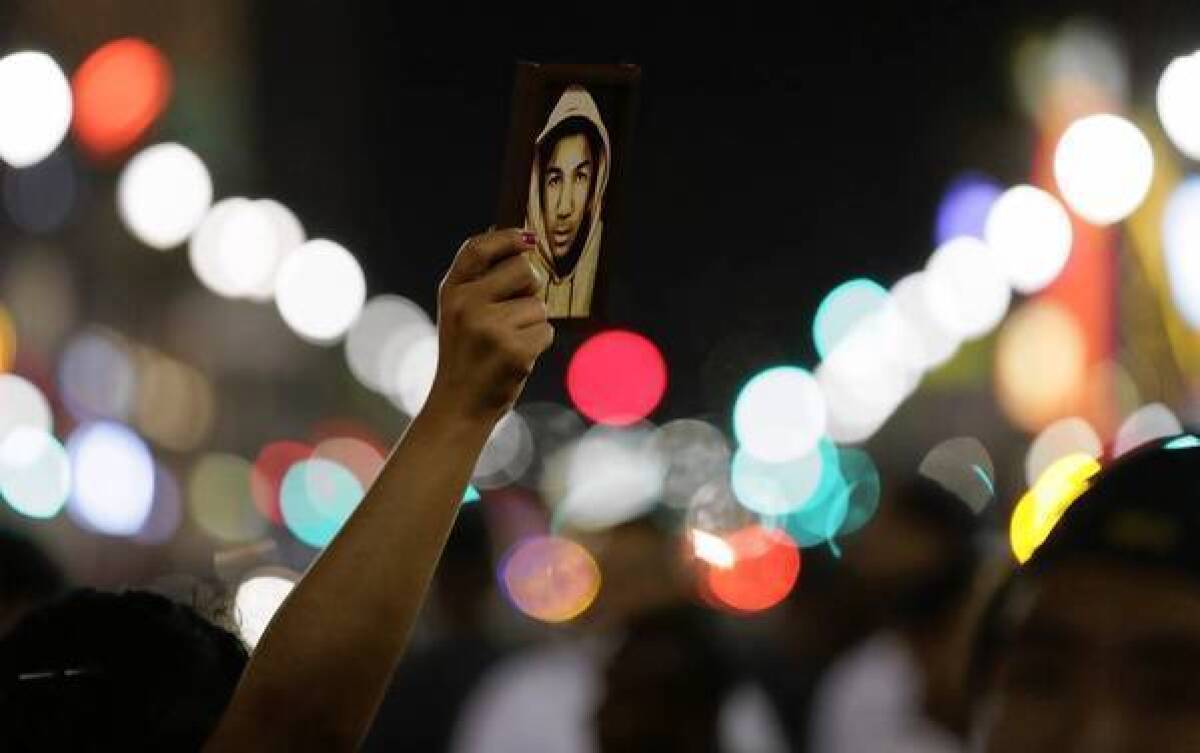Heartsick and numb over Zimmerman verdict

- Share via
I didn’t want to write about Trayvon Martin this week. I already had another column planned, something tidier, less contentious.
But the obligation weighs on me, even though I’m still emotionally raw, grappling with what the verdict — and the bile it has unleashed — says about our country and our humanity.
I realized George Zimmerman had been acquitted while I was running errands Saturday. I didn’t need to check my phone to know.
LIVE BLOG: Ongoing coverage of Crenshaw protest
I saw it in the face of the sullen young black man rushing out of the grocery store as I walked in; I registered the pain when his eyes locked on mine. And I felt it in the checkout line, where the typically sunny cashier was uncommonly silent, testy even. She’s a black woman, the mother of two boys.
I put myself on lockdown when I got home, tethered to the news and my Facebook page, hungry for explanations and support, and disheartened instead by all the rambling about what Trayvon should have done to not be dead.
The verdict left me not so much angry, but heartsick and numb. I’d tried to prepare. I’d seen this one coming:
The murder case was weak under Florida law. The prosecution overcharged and underperformed. The defense shamelessly played the race card. There was no cellphone video, no surveillance film and no eyewitness accounts. The only person who could dispute Zimmerman’s tale of what happened that night is dead.
Still, the verdict may be legally correct, but it isn’t moral justice. It’s a perversion of right and wrong.
And it feels like a revelation I’m not willing to accept: In some parts of this country, being shot to death is considered an acceptable punishment for an unarmed black teenager who dares to stand his ground.
::
What do we tell the children?
That’s the cliched question we trot out when we’re confounded by cases like this. This time, for black parents at least, it’s more than rhetoric.
Lawrence Ross is an Inglewood author who travels to colleges around the country, counseling and encouraging black students. Ross is also the father of a 14-year-old boy, whose favorite show of independence these days is walking alone to the 7-Eleven near their gated community.
Ross has spent years teaching his son to be safe and not fall prey to others’ fears:
If you’re driving and the police stop you, put both hands on the dashboard, so the officer can see you don’t pose a threat. If you’re in the elevator alone with a white person, speak so they’ll know you’re articulate and they don’t have to fear you.
But the verdict delivered a message that mocks those parental pretensions: “The world has just been told that my son is [going to be] the aggressor,” Ross said. “That he has no right to exist without question or explanation. That’s devastating to me.
“I want him to walk out in the world as a productive and kind adult, without burdening him with all the sociological issues this country brings.” But he also can’t afford to let naivete disarm his boy.
“What is the safe point? That’s the conundrum. That’s what makes this resonate so strongly.”
It’s a conundrum that isn’t new for black families raising boys in multicultural settings. It’s why mothers don’t let their sons have paintball guns, when their white friends in suburbia do. And why fathers fasten college frames around the license plates of their sons’ cars, to make kindred spirits of strangers.
The verdict makes a mockery of all those desperate bargains.
George Zimmerman’s paranoia became Trayvon Martin’s crime. How do you guard against that?
::
I have a bunch of notes scattered across my desk. I was going to bombard you with the facts that make this exoneration a travesty. But hours of reading tweets, message board comments and Facebook posts made me realize how futile that would be.
People see what they want to see, what they’re primed to recognize. We bring our own histories to this case, and our judgments reflect that.
“I don’t want to move forward,” Ross posted on Facebook when some of his online friends tried to soft-pedal the outcome. “I don’t want to have a conversation on race. I don’t want to educate anyone on the deplorable history of the worthlessness of black lives in the eyes of the law. And I don’t want to hear about I need to get over this.
“Trayvon’s case shows what we’ve always known, and America keeps trying to tell us: We’re nothing,” he wrote.
Some of my other Facebook friends tried to give Zimmerman the benefit of the doubt.
Zimmerman considered Trayvon “suspicious” because some other random black kids had burglarized homes in the neighborhood several months before. That made this particular black boy — who was walking in the rain with his hoodie on, chatting on his phone — one of those “punks” who might get away with something if Zimmerman didn’t intervene.
If that logic doesn’t trouble you, you have probably never carried the weight of being judged by what others do.
It’s a painful narrative that, over generations, black people have grown accustomed to. And it’s a sobering reality check for a young generation encouraged to believe instead in limitless individuality.
My children have grown up in a black-man-can-be-president world. Now they have to accept that an unarmed black kid can be killed with impunity if someone thinks he just might possibly — with no evidence — be up to no good.
This seems like history being replayed, progress erased. It calls to mind my parents’ stories of life in the South, when black safety depended on white goodwill and submission kept you in the authorities’ good graces.
“Don’t forget to set your clock back 50 years before you go to bed tonight,” one friend wrote on his Facebook page the day the verdict was announced.
That’s the way I feel today.
More to Read
Sign up for Essential California
The most important California stories and recommendations in your inbox every morning.
You may occasionally receive promotional content from the Los Angeles Times.










